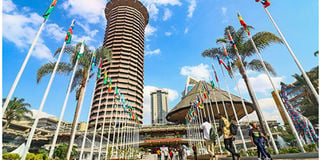Blow to Kanu as court revokes its ownership title of KICC

The Kenyatta International Convention Centre in Nairobi.
What you need to know:
- Kanu wanted the court to declare that it was the beneficial owner of the land LR No. 209/11157, having been allocated the land and obtained a title deed 20 years later, for 99 years.
- Justice Mogeni upheld a new title deed- registration number 209/19829 on June 1, 2010, to the PS Treasury as a trustee for the Ministry of Tourism, saying it was valid.
Plans by the former ruling party, Kenya African National Union (Kanu), to reclaim the Kenyatta International Convention Centre (KICC) has been dealt a blow after a judge ruled that it illegally acquired a title deed to the land where the building stands.
Justice Jaqueline Mogeni further ruled that the land was not available for alienation hence the process leading to the allocation of the parcel to Kanu was illegal from the start.
The Environment and Land Court judge revoked the title deed issued to the independence party on May 25, 1989, saying the allotment letter given to Kanu on May 10, 1969, by the commissioner of lands, was unprocedural.
“The allocation of the land to the petitioner (Kanu) was unlawful, illegal and unconstitutional from the start,” the judge said, adding that a subsequent title deed issued to the Ministry of Tourism was valid.
The judge questioned why the former ruling party and its officials failed to follow due process in the alienation of the land
“Who allocated the land to the petitioner? Was it the President or the commissioner for lands? Was it done with the often-quoted attitude of Mta Do! (What will you do) or was it the failure to understand the law?” the judge posed.
According to the judge, the process adopted in allocating the land would have been correct if the parcel was meant for religious, educational, or sports purposes but not for a political party.
Justice Mogeni further said Kanu did not table a part development plan (PDP), which indicates the precise site for immediate implementation of specific project, to support its case.
Justice Mogeni upheld a new title deed- registration number 209/19829 on June 1, 2010, to the PS Treasury as a trustee for the Ministry of Tourism, saying it was valid.
Kanu wanted the court to declare that it was the beneficial owner of the land LR No. 209/11157, having been allocated the land and obtained a title deed 20 years later, for 99 years.
The title deed bore the names of former President Daniel arap Moi and former minister Oloo Aringo, as trustees of Kanu, and former commissioner of lands Wilson Gachanja allocated the party the land.
The party said it had the right to own and dispose of the property but its rights were irregularly and unlawfully curtailed through an Executive Order on February 11, 2003, reclaiming the property.
Through the order, the government evicted Kanu, its agents and tenants from the building and took over the KICC, although it was never served with the order.
The former ruling party argued that its title deed had not been recalled or revoked and the takeover was, therefore, illegal and in breach of its rights.
The party said despite taking over the KICC, the government failed to settle the electricity bills, a move that saw its Nakuru branch office attached for a debt that had risen to Sh738 million by Kenya Power and Lighting Company.
Justice Mogeni said Kanu has to shoulder the burden of paying the bill because it was illegally occupying the 28- storey building.
The government had opposed the case arguing that the space was set aside for public purposes and the building was constructed at a cost of £3.9 million using public funds.
The court was also informed that prisoners were deployed to provide labour for the construction of the building and that prisoners belonged to the state and were deployed to the site to save on cost.
Kanu, not being a state organ could not direct prisoners to work for the project, the court was informed.
Mr Timothy Waiya Mwangi, deputy director- physical planning at the Ministry of Lands said the land could not have been allocated to Kanu as it was meant for public spaces in 1948.
The official said public spaces are key elements of individual and social well-being, the places of a community’s collective life, expressions of the diversity of their common natural and cultural richness and a foundation of their identity, the official added.
“In keeping with the established philosophy of planning and location of public squares, functions carried out in all the above buildings are public and accessible to all. The land use within and around the square was and is still characterised by public purpose use,” Mr Mwangi said.
Also Read: President Ruto defends KICC privatisation
He said with regard to physical and land use planning principles, practice and norms, Kanu could not and cannot be accommodated within the Nairobi city square because it would be non-conforming.
He explained that within the square were the High Court (Now Supreme Court) Buildings, Jogoo House A, Public Works Building (Harambee House) and the Attorney General’s chambers.
Outside the square, he said, were the Parliament Buildings, Holy Family Basilica, City Hall and the Vigilance House.
Mr Mwangi said on Monday the Supreme Court Buildings, Harambee House, Sheria House, the KICC, Comesa Grounds, Jogoo House A and B, the Commission House and the Ministry of Foreign Affairs are within Government Square.
Outside the square are Parliament Buildings, Holy Family Basilica, City Hall, Kenya Re Plaza, the National Treasury and the police headquarters.
Mr Mwangi said the city square is a public space owned by the government in trust for the people of Kenya because it is situated in the central business district of Nairobi.




